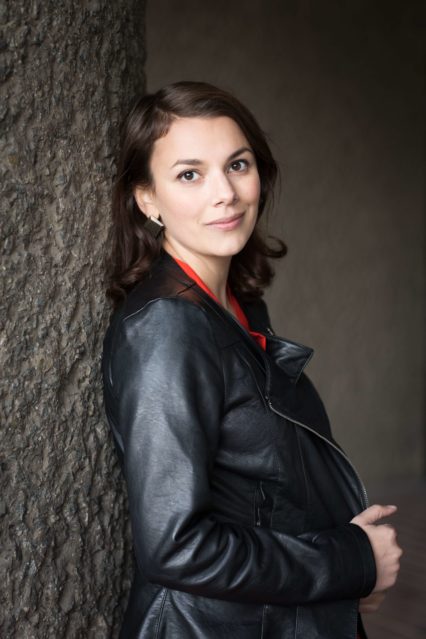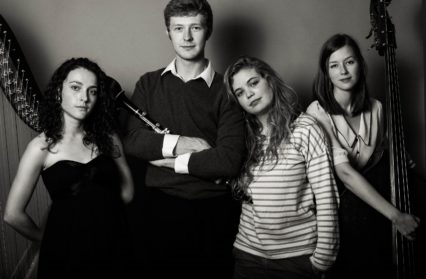Cath Barton casts a critical eye over a concert by The Hermes Experiment as part of St. David’s Hall’s series NightMusic.
Time was, you might have found a concert like this in a smoky basement, perhaps with a handful of lonely listeners. Or perhaps I’m romanticising the past. In the present, big concert halls like St David’s Hall in Cardiff are looking for new ways of bringing in audiences, and so is born the concept of their NightMusic.
Presenting music in the foyers of concert halls is not new, but generally it’s been done as a pre-concert or interval diversion. St David’s Hall are now using their Level 3 Foyer as a ticketed performance space on certain evenings. As part of this, NightMusic is a new series of contemporary classical concerts in collaboration with Tŷ Cerdd, which has commissioned new work from Welsh composers to receive their first performances here, curated by composer Freya Waley-Cohen. A concert by The Hermes Experiment was the first of three NightMusic events programmed for the early part of this year.
We were a reasonably big crowd, filling up, indeed over-flowing the space round the small tables. The space is still a foyer. The lighting was partly moody blue (yes, atmospheric), though partly (if you sat in the wrong place) shining in your eyes. But as soon as the musicians started to play the space was transformed and the music took us in thrall. The Hermes Experiment are a quartet who say on their website that a core part of their vision is to make classical music relevant to everyone, and that they want to challenge the stereotypes and formalities with which it is often associated. They were a perfect choice for this (in their terms probably fairly mild!) experiment in concert presentation.

The programme cut straight through the stereotypes about contemporary classical music – that it is difficult, ‘squeaky-gate’, lacking in melody, boring, and so on. The quartet presented a fantastic variety of pieces, several of them commissioned by them from young composers. The pieces were short, sparky and by turns touching, stirring and funny. Sadly, the group’s soprano (and co-director), Héloïse Werner, was unwell and replaced at short notice by Raphaela Papadakis. Happily, she fitted into the quartet as if she had been singing with them for years, clearly a consummate professional and wonderful musician, as indeed the trio of instrumentalists showed themselves to be.
The concert opened with two delightful songs from Emily Hall, I am happy living simply and The end of the ending (2017) commissioned by The Hermes Experiment for their eclectic combination of sounds. In two short settings of fragments of poetry by early twentieth-century Russian poet Marina Tsvetaeva, Hall used the percussive sounds of the double bass and harp in counterpoint to the melodic voices of clarinet and soprano. Harmonically pleasing, these songs were a perfect way to open a concert.
Piano miniatures by Prokofiev, and Peter Maxwell Davies’ Farewell to Stromness, arranged by members of the quartet, were fascinating for their display of the range and potential of the group’s unusual combination of clarinet, harp and double bass. Heard in this harmonically expanded way the Prokofiev four Visions Fugitives reveal themselves as tiny tone-poems: for example the last of them, marked to be played ‘dolente’ – mournfully – ends most expressively on a plaintive high note in the clarinet.
Between the two was another of the group’s many commissions, Tanka (2015) by Josephine Stephenson, this one originally part of a musical ‘exhibition’ of responses to photographs, and setting words – and fragments of words – by writer and musician Ben Osborn. To me this piece revealed the often false dichotomy we make between instruments and voices, using them in equal measure to create an aural picture.
The second set opened with the new Tŷ Cerdd commission, Hymn to Hermes by Joseph Davies, introduced by the composer; the subject chosen, he said, in view of the name of the group who would be playing it. The text, a kind of prayer, would originally, he told us, have been sung within a religious ritual, accompanied by the burning of frankincense. This was a striking, forceful piece, sung in Greek, which exploited the full expressive range of the forces at the composer’s disposal. Where else, said clarinettist Oliver Pashley, would he have had an opportunity to glissando to the highest note of his instrument?! I would have loved to have heard his piece played for a second time later in the concert. In all seriousness why not do this with a new piece that is short like this? – it gives the audience an opportunity to take it in more deeply, and it gives the composer two performances for (as it were) the price of one.
Debussy’s Voiles, an arrangement of a piano prelude, sat as a quietly reflective contrast, and was followed by Kate Whitley’s My Hands (2016), conveying viscerally the anxiety felt by refugees arriving in a new country, and then by Giles Swayne’s gently humorous ‘Sardines à l’huile’ from his Chansons dévotes et poissonneuses (2014). The contrasts sound extreme, but worked magnificently well.
The third and final set began with a jazz/swing version by Misha Mullov-Abbado of the folk song The Linden Tree (2015); continued with Leonard Bernstein’s joyous song-cycle ‘I Hate Music!’ (arr. Millwood); traversed London by individually random (but concordant) routes using Ewan Campbell’s graphic score superimposed on the Tube map, London, he felt fairly certain, had always been London (2015); and finished up with a glorious and totally unclichéd arrangement by Oliver Pashley of George and Ira Gershwin’s I Got Rhythm.
The short sets with intervals between not only gave the audience time to refresh their glasses but also to digest the musical richness of this concert. And while we may not have been able to chat to the artists as much as advertised – after all they need their breathing space too – we, the audience members, struck up conversations with one another round our small tables in ways which may well not have happened if we’d been at a concert in the main house!
This was a revelatory evening for me – so many musical voices that were new to me and that I will look out for in future. And with further NightMusic events coming up on 4 April and 8 May, lots more new music to look forward to.
NightMusic
The Hermes Experiment
Anne Denholm, harp
Oliver Pashley, clarinet
Marianne Schofield, double bass
Raphaela Papadakis, soprano
L3 Lounge, St David’s Hall, Cardiff
13 February 2018
Photo credit : The Hermes Experiment with soprano Héloïse Werner by Thurstan Redding
Cath Barton’s novella The Plankton Collector is due to be published in September 2018 by New Welsh Review under their Rarebyte imprint. She has been awarded a place on the 2018 Literature Wales Mentoring Scheme, to work on a collection of short stories inspired by the work of the sixteenth century Dutch artist Hieronymus Bosch.



 Enjoyed this article? Support our writers directly by buying them a coffee and clicking this link.
Enjoyed this article? Support our writers directly by buying them a coffee and clicking this link.







